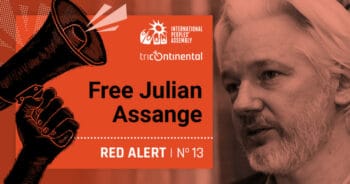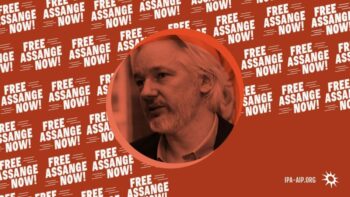Dear friends,
Greetings from the desk of the Tricontinental: Institute for Social Research.
Twenty years ago, on 11 January 2002, the United States government brought its first ‘detainees’ abducted during the so-called War on Terror to its military prison in Guantánamo Bay. U.S. Defence Secretary Donald Rumsfeld said, ‘We do plan to, for the most part, treat them in a manner that is reasonably consistent with the Geneva Conventions’. For the most part. Evidence began to emerge almost immediately–including from the International Committee of the Red Cross–that the Geneva Conventions were being violated and that many of the prisoners were being tortured. By December 2002, the U.S. media began to report that ‘many held at Guantánamo [were] not likely terrorists’.
Nearly 780 known ‘detainees’ have been caged in the prison over these past two decades; currently 39 men remain, most of whom have never been charged. While U.S. President Joe Biden has said that he wants to close the detention camp, he has, in fact, authorised plans to expand it. The Biden administration is spending $4 million to build a new secret courtroom in the facility, which will be closed to the public. Whether the remaining prisoners will now be granted trials and have their fates decided upon is yet to be seen. On 10 January 2022, independent experts of the United Nations Human Rights Council found that ‘Guantánamo Bay is a site of unparalleled notoriety, defined by the systematic use of torture, and other cruel, inhuman or degrading treatment against hundreds of men brought to the site and deprived of their most fundamental rights’.
One of these men, Sami al-Hajj, was picked up by Pakistani troops on the Afghanistan-Pakistan border on 15 December 2001 and then handed over to the U.S. on 6 January 2002. Al-Hajj was then transferred to Guantánamo on 14 June 2002, where he remained until his release to Doha, Qatar on 31 May 2008. The U.S. government accused al-Hajj of being a member of al-Qaeda as well as part of the leadership of both the Taliban and the Muslim Brotherhood. He was also accused of providing weapons and funds to groups in Chechnya via the Saudi charity al-Haramain.
We know these details about al-Hajj thanks to the Detainee Assessment Briefs (DABs) leaked to the media via WikiLeaks in April 2011. These Gitmo Files are remarkable because each of the DABs show us the misinformation at the base of the War on Terror. A close reading of al-Hajj’s DAB shows that he was not a leader of any of these organisations; he was actually a journalist with Al Jazeera. Al-Hajj began working for Al Jazeera in early 2000 and was sent to Afghanistan in October 2001 to work with his colleagues Yusuf al-Sholy and Saddah Abdul Haq. There was no evidence that al-Hajj was a member of al-Qaeda, the Taliban, or the Muslim Brotherhood. According to the DAB, he was brought to Guantánamo to give information about Al Jazeera’s training programme as well as various charity groups that operated in Azerbaijan, Kosovo, and Macedonia.
In 2007, al-Hajj’s lawyer, Clive Stafford Smith, wrote that his client had ‘been on hunger strike for more than 230 days, more than three times as long as the IRA strikers in 1980’. When al-Hajj arrived in Doha, he said that he had been interrogated 130 times, ‘mostly related to his work with Al Jazeera’.
The DABs helped lawyers such as Stafford Smith find out who was behind the fence at Guantánamo and what lies were being told about them. Thanks to WikiLeaks, this information was made public. No one responsible for the crimes at Guantánamo has been tried for the ‘systematic use of torture’, as human rights experts have noted. Yet the co-founder and publisher of WikiLeaks, Julian Assange, sits in Belmarsh Prison, Britain’s Guantánamo. The U.S. seeks to extradite him to face charges of espionage. Who is Julian Assange and why is the U.S. so desperate for his extradition? Along with the International Peoples’ Assembly, Tricontinental: Institute for Social Research has produced the following Red Alert no. 13, Free Julian Assange.
Who is Julian Assange and what is WikiLeaks?
 Julian Assange is an Australian journalist and publisher who co-founded WikiLeaks in 2006. WikiLeaks is a website that was designed to publish documents leaked to it anonymously by officials from governments and corporations. The project was inspired by Daniel Ellsberg’s 1971 release of the Pentagon Papers, a U.S. government internal document that showed the extent of its deceit in prosecuting the war in Vietnam. Between 2006 and 2009, WikiLeaks published a series of important documents that contained revelations such as the membership list of the fascist British National Party (2008), the Petrogate oil scandal in Peru (2009), and a report on the U.S.-Israeli cyber-attack on Iranian nuclear energy facilities (2009). In 2013, the International Federation of Journalists called WikiLeaks a ‘new breed of media organisation based on the public’s right to know’.
Julian Assange is an Australian journalist and publisher who co-founded WikiLeaks in 2006. WikiLeaks is a website that was designed to publish documents leaked to it anonymously by officials from governments and corporations. The project was inspired by Daniel Ellsberg’s 1971 release of the Pentagon Papers, a U.S. government internal document that showed the extent of its deceit in prosecuting the war in Vietnam. Between 2006 and 2009, WikiLeaks published a series of important documents that contained revelations such as the membership list of the fascist British National Party (2008), the Petrogate oil scandal in Peru (2009), and a report on the U.S.-Israeli cyber-attack on Iranian nuclear energy facilities (2009). In 2013, the International Federation of Journalists called WikiLeaks a ‘new breed of media organisation based on the public’s right to know’.
In 2010, while based in Iraq, U.S. Army intelligence analyst Chelsea Manning downloaded hundreds of thousands of documents, including videos, from U.S. government servers. She sent them to WikiLeaks with a note, saying, ‘This is possibly one of the more significant documents of our time removing the fog of war and revealing the true nature of 21st century asymmetric warfare’. In November 2010, WikiLeaks partnered with major newspapers (Der Spiegel, El Pais, The Guardian, Le Monde, The New York Times) to publish the diplomatic cables (CableGate) that came from Manning’s tranche of documents. WikiLeaks also published the Iraq War Logs and the Afghan War Diaries, which contained materials that suggested that U.S. forces had committed war crimes in both countries. Amongst these documents was a classified video from 2007 showing U.S. forces killing civilians, including employees of the news organisation Reuters. This video, released by WikiLeaks as Collateral Murder, had an enormous impact on public opinion about the nature of U.S. warfare.
In November 2010, U.S. Attorney General Eric Holder said that his office had opened ‘an active, ongoing criminal investigation’ against WikiLeaks.
Why is Julian Assange in Belmarsh Prison (London, UK)?
 By early December 2010, senior U.S. politicians called upon the U.S. government to prosecute Assange under the Espionage Act (1917). Sexual assault allegations in Sweden drew Assange into a legal net. While willing to return to Sweden to face the allegations, he wanted an undertaking that Sweden would not extradite him to the U.S., where he faced life imprisonment on potential espionage charges. Sweden, in close contact with the U.S., refused to provide this undertaking. In 2012, Assange received asylum at Ecuador’s embassy in London. In April 2019, Ecuador’s government–in exchange for what it considered a favourable deal with the International Monetary Fund–handed Assange over to British authorities. Assange was taken to Belmarsh prison to await hearings for extradition not to Sweden, which had dropped its investigation, but to the United States.
By early December 2010, senior U.S. politicians called upon the U.S. government to prosecute Assange under the Espionage Act (1917). Sexual assault allegations in Sweden drew Assange into a legal net. While willing to return to Sweden to face the allegations, he wanted an undertaking that Sweden would not extradite him to the U.S., where he faced life imprisonment on potential espionage charges. Sweden, in close contact with the U.S., refused to provide this undertaking. In 2012, Assange received asylum at Ecuador’s embassy in London. In April 2019, Ecuador’s government–in exchange for what it considered a favourable deal with the International Monetary Fund–handed Assange over to British authorities. Assange was taken to Belmarsh prison to await hearings for extradition not to Sweden, which had dropped its investigation, but to the United States.
The U.S. government indicted Assange on 18 charges related to the obtaining and publishing of classified documents, which could result in a sentence of up to 175 years in prison. However, 17 of these charges were only levied after Assange entered British custody. Initially, Assange was only charged with conspiring with Manning to crack a password and hack into the Pentagon’s computer system, which on its own carries a short prison term of up to 5 years. The problem here, it appears, is that the U.S. government has no evidence that Assange colluded with Manning to break into U.S. servers; Manning says that she acted alone in acquiring and delivering the documents to WikiLeaks.
Thus, the U.S. government seeks to bring Assange to the U.S. to be tried under the Espionage Act for soliciting, obtaining, and then publishing classified information–in other words, precisely the work of an investigative journalist. It is journalism, therefore, that Assange is being prosecuted for.
What can you do to free Julian Assange from prison?
Mobilise. Take to the streets on 25 February 2022. Protest outside the embassies and consulates of the United Kingdom and the United States. Demand that these governments respect international law and Julian Assange’s fundamental rights.
Send a letter. Sign this letter drafted by the International Peoples’ Assembly and send it to your local British embassy or consulate telling them to respect their legal responsibilities.
Participate. Follow the International Peoples’ Assembly on social media to learn more about Assange’s case and his contributions to the anti-imperialist struggle today. Share our materials with your communities and movements. Help us get the word out about why we must #FreeAssangeNOW! Register online to participate in the Belmarsh Tribunal to free Julian Assange.
In 2020, Roger Waters spoke at a rally for Julian Assange in London. In his closing remarks, he shared a story about his mother:
As a young supply schoolteacher in the North of England before the war, she saw the children of mill workers walking barefoot to school through snow in the depths winter. In that moment, my mother’s light went on, and it stayed on, burning bright for the rest of her life. One day, when I was thirteen or fourteen, she said to me, ‘As you go through life, Roger, you will encounter difficult times and difficult questions that you will need to ponder. It won’t always be easy, so here is my advice to you for those times: seek the truth, look at the question from all sides; by all means, listen to other opinions, try to remain objective. When you’ve come to the end of your deliberations, the hard work is over; now comes the easy bit. Do the right thing’.
Do the right thing: free Julian Assange and shut down Guantánamo.
Warmly,
Vijay


